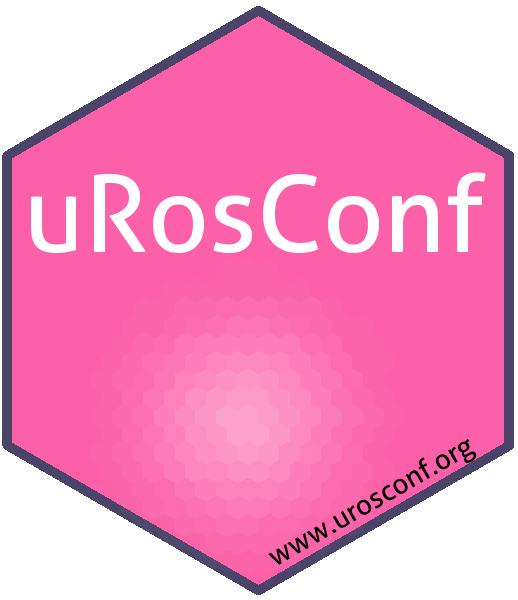The R Project - The Use of R in Official Statistics - uRos2021
Visit this website regularly for updates or follow us on Twitter.
uRos2021 virtual event 24-26 November 2021
The annual conference on the Use of R in Official Statistics will be organized as a virtual event, on 24-26 November 2021. Details about the format and the programme will be announced soon.

Over the last two decades R has become the lingua franca for statisticians, methodologists and data scientists worldwide. The reasons why the official statistics community is rapidly embracing R are clear: it has an active worldwide community of users, there is wide support from the industry and it combines a vast amount of functionalities for data preparation, methodology, visualisation and application building. Moreover, R-based software is exchanged through strictly enforced technical standards: “R is probably the most thoroughly validated statistics software on Earth.” – Uwe Ligges, CRAN maintainer (useR!2017).
Finally, R is a free (libre) Open Source software product, making it an ideal environment for sharing, collaboration and industrialising official statistics.
The annual event “use of R in Official Statistics” started as a local conference at the Statistical Office of Romania in 2013, with the first international edition being held at that same office in 2014. In 2018, Statistics Netherlands hosted the sixth edition of this event, which brought together official statisticians, scientists, and prominent members of the R community to share ideas on using and developing R tools in the area of official statistics.
In 2020, was Statistics Austria’s turn to host the conference, for the first time being a virtual event.
The ninth edition of the event will take place again as virtual event, hosted by its home country and institution - Romanian National Statistics Institute.
Hopefully the first decade edition - uRos2022 - will happen as on-site event.
Abstracts
You can browse all the accepted abstracts at https://uros.hopto.org/.
Download the book of abstracts: book-of-abstracts-uros2021.pdf
Important dates
- Abstracts and tutorials submissions deadline: 15th of September 2021
- Notification of acceptance: 5th of October 2021
- Scientific conference: 24- 26 November 2021
- Journal paper submission deadline: 15th of January 2022
Keynote Speakers
We are happy to have two excellent keynote talks by Heather Turner and Edwin de Jonge.
Heather Turner
is an Associate Professor and Research Software Engineering Fellow in the Statistics Department at the University of Warwick, UK. She joined the department in 2004 after working towards her PhD in Statistics at the University of Exeter. She had a break of just over a decade working outside academia from 2010, initially at Pfizer and then as a freelance consultant. Both in and out of academia, her work has focused on the development of statistical code and software, primarily for researchers in the life and social sciences. Heather has been an R user since 2001 and has co-authored several CRAN packages, notably the statistical modelling packages gnm, BradleyTerry2 and PlackettLuce. She is on the board of the R Foundation and chairs the Forwards taskforce for underrepresented groups in the R community.

“Structured Effects with Generalized Nonlinear Models”
Generalized linear models are a standard tool in statistical analysis. In particular, the special cases of logistic regression and log-linear models are go-to methods for modelling binary and count (or rate) data respectively. However, using a linear predictor for the mean response can be quite limiting - models with satisfactory goodness of fit are often overly complex and difficult to interpret. Using a nonlinear predictor can be a way to solve both these issues.
This talk will introduce the R package gnm, which provides facilities for specifying and estimating Generalized Nonlinear Models (GNMs). The application of GNMs will be demonstrated through two case studies in sociology and demography. The first will demonstrate the use of a structured main effect, by using Diagonal Reference Models to model the diluting effect of social mobility on health inequality. The second will demonstrate the more common use case of a structured interaction, by using the Lee-Carter model to model mortality trends.
Edwin de Jonge
is a methodologist and data scientist at Statistics Netherlands (CBS) and works 20 years at it research department. His expertise is statistical computing, network analysis and data visualization.
His current research includes data editing and complexity science: reconstructing network datasets from business registers using stochastic methods.
He is co-author of Statistical Data Cleaning with applications in R (2019) and (co)author of several R packages including validatedb, sdcSpatial, cbsodataR, errorlocate, whisker and tableplot.

“The unexpected value of R in official statistics”
R is an incredible statistical environment, in which many statistical procedures are available and can be readily used.
It is predominantly used in the statistical and data science community and has an increasing important role in the creation of Official Statistics.
Although engineered for statistical analysis, R plays in many offices also an auxiliary role in the production, visualization and publishing part of official statistics.
The presentation addresses several expected and unexpected usages of R in the production process of statistical offices and sketches possible directions for statistical offices for using R.
Programme
Time from the programme is Central European Time (CET) (GMT+1).
Download the detailed programme: Agenda_uRos2021.pdf
- The conference will be streamed via Webex (for presenters only) and Youtube (for the large audience).
- The Webex links will be received on email by the presenters.
- The Youtube links will be available on this website with 15 minutes before starting hour, for each session, below.
November 24, Wednesday
https://youtu.be/RPxrae-VuDI Recorded
09:45 - 10:00 Welcome message
10:00 - 11:00 Keynote Heather Turner
11:00 - 12:30 Scientific Session Data cleaning
12:30 - 13:30 Lunch break
https://youtu.be/8IueOkdFtdQ - Recorded
13:30 - 15:00 Scientific Session Methods for official statistics
15:00 - 15:15 Break
https://youtu.be/fnCeAXtGRbk - Recorded
15:15 - 16:15 Scientific Session R in production: data analysis
November 25, Thursday
https://youtu.be/pJZeMipX2GU - Recorded
09:00 - 10:00 Keynote Edwin de Jonge
10:00 - 11:10 Scientific Session Sampling and estimation
11:10 - 12:00 Scientific Session Big data
12:00 - 13:00 Lunch break
https://youtu.be/kjUtApjK6XE - Recorded
13:00 - 14:15 Scientific Session Dissemination and visualization
14:15 - 15:15 Scientific Session R in production: automation
15:15 - 15:30 Break
https://youtu.be/kjUtApjK6XE - Recorded
15:30 - 16:15 Scientific Session Shiny applications
16:15 - 17:00 EMOS coding labs presentation of preliminary results
November 26, Friday
https://youtu.be/PvZWRr2vsdE - Recorded
09:30 + 11:30 Tutorial: Selecting auxiliary variables in R
11:30 – 12:30 Lunch Break
https://youtu.be/zoaOeYSMWlM - Recorded
12:30 – 14:30 Tutorial: Probabilistic record linkage using reclin
https://github.com/djvanderlaan/tutorial-reclin-uros2021
14:30 – 15:00 Break
https://youtu.be/DHI4MLMwLcg - Recorded
15:00 – 16:00 Panel talk: Computing in the Statistical Office
16:00 – 16:30 Good bye and invitation to uRos2022
Register
No registration necessary. The conference will be organized as online event with free access for everybody. The information on how to access the different sessions will be posted on this website.
Call for abstracts - presentations
We are cordially inviting you to submit papers to and attend the International Conference The Use of R in Official Statistics – uRos2021 until 15th of September 2021.
There will be two kind of presentations “regular presentations” with roughly 15 minutes time slots and “lighting presentations” with 5 minutes time slots and automatic cycling through the slides. Please indicate your preference, but the scientific committee will finally assign the presentations into the two categories.
The purpose of the conference is to provide a public forum for researchers from academia and institutes of official (government) statistics to present, exchange ideas and discuss developments in state-of-the-art statistical software commonly used in applied economics and statistics. The most focused debates are expected to be on the use of R in Official Statistics.
The topics covered by the conference are the following:
- R in census
- Sampling and estimation
- R in organization
- Data cleaning
- R in production: data analysis
- Methods for official statistics
- Shiny applications
- Time series
- Report and GUI programming
- R in production: automation
- Big data
- Dissemination and visualization
The participants are kindly asked to submit the abstract via e-mail to: anamaria.ciuhu [at] insse.ro preferably as plain text or Word or PDF, there is no template for the abstract submission.
Call for abstracts - tutorials
Tutorials will be 2 to 4 hours in length (1 slot is 2 hours). Tutorials will be presented one per day, as live presentations. The scope of the tutorials comprises the whole statistical production process of official statistics. Deadline for tutorial submission is 31 of July 2021.
Papers for Special Journal Issues
Authors with an accepted abstract can submit a full-length paper for a special section of R Journal or a journal special issue of Romanian Statistical Review.
For both journals, submission deadline will be January 15, 2022.
Submissions for R Journal will be directly to the journal, including the keyword uRos2021 into the message.
Submissions for Romanian Statistical Review: Ana Maria Ciuhu, anamaria.ciuhu [at] insse.ro
About the journals
Romanian Statistical Review
A maximum of ten selected research papers will be published in a special issue of the Romanian Statistical Review. Publications are subjected to passing the standard peer review process. Please make sure to follow the RSR author guidelines.
Papers should be submitted no later than 15 January 2022 to the uRos2021 secretariat via e-mail to: anamaria.ciuhu [at] insse.ro
The Romanian Statistical Review is included in the Web Of Science Core Collection - Emerging Sources Citation Index (ESCI), a Clarivate Analytics database. It aims to provide a favourable space for exchange of ideas and a challenge at the same time. Any paper that can contribute to the understanding of statistics as a science is welcome. It is open-access without any fees.
R Journal
A selection of papers will be published in a special section of R Journal. Publications are subjected to passing the standard peer review process. Please make sure to follow the R Journal author guidelines.
Papers should be submitted no later than 15 January 2022, directly to the R Journal, including the keyword uRos2021 into the message.
The R Journal is the open access, refereed journal of the R project for statistical computing. It is run under the auspices of the R Foundation, and editors of the Journal are appointed by the board of the Foundation.
Organisation
Organizing committee
- Ana Maria Ciuhu (Statistics Romania and Institute of National Economy, Romanian Academy)
- Bogdan Oancea (Statistics Romania, University of Bucharest)
- Ciprian Alexandru (Ecological University of Bucharest)
- Alexander Kowarik (Statistics Austria)
- Mark van der Loo (Statistics Netherlands)
- Nicoleta Caragea (Statistics Romania, Ecological University of Bucharest)
Scientific Board
- Tudorel Andrei (President, National Institute of Statistics - Romania)
- Matthias Templ (ZHAW school of engineering, Switzerland)
- Adrian Dusa (University of Bucharest, Romania)
- Elena Druica (University of Bucharest, Romania)
- Kazumi Wada (Ministry of Internal Affairs and Communications, Japan)
- Marcello d’Orazio (Italian National Institute of Statistics - Rome, Italy)
- Valentin Todorov (UNIDO, Vienna Austria)
- Alina Matei (University of Neuchatel, Switzerland)
- Bernhard Meindl (Statistics Austria, Austria)
- Edwin de Jonge (Statistics Netherlands, The Netherlands)
- Kamarul Ariffin Mansor (MARA University of Technology, Malaysia)
- Marius Nicolae Jula (University of Bucharest, Romania)
- Matyas Meszaros (Eurostat, Luxemburg)
- Roxana Adam (University of Bucharest, Romania)
Contact
We look forward to meet you online for uRos2021! The conference secretariat can be reached via: anamaria.ciuhu [at] insse.ro
Secretariat
Ana Maria Ciuhu, National Institute of Statistics, Romania, Email: anamaria.ciuhu [at] insse.ro
Roxana Glavan, The Bucharest University of Economic Studies & National Institute of Statistics, Romania
Ana Țîru, National Institute of Statistics, Romania
Code of Conduct
Organisers, speakers, registered participants, and sponsors of the uRos conference and/or unconfUROS hackathon, as well as persons or organizations following and discussing the conference through (social) media or internet are required to follow this Code of Conduct. We shall refer to the combined group as ‘participants’ of the uRos conference.
Privacy: participants respect each other’s privacy. In particular it is not allowed to systematically gather information on organisers, speakers and (registered) participants, including but not limited to personal life, professional position, political views, social media outings, open source contributions, or pictures.
Open: participants are open to collaboration, whether it’s on projects, working groups, packages, problems, or otherwise. Participants are receptive to constructive comment and criticism, as the experiences and skill sets of other participants contribute to the whole of our efforts. Participants are accepting of anyone who wishes to take part in their activities, fostering an environment where all can participate and everyone can make a difference.
Respectful: participants are respectful of others, their positions, their skills, their commitments, and their efforts. They are respectful of the volunteer efforts that permeate the R community. In the case of disagreement, participants are courteous in raising their issues. Participants are attentive in communication, whether in person or online, and tactful when approaching differing views. They refrain from demeaning, discriminatory, or harassing behaviour and speech.
Considerate: participants are considerate of their peers — fellow uRos participants. They are thoughtful when addressing the efforts of others, keeping in mind that oftentimes the labour was completed simply for the good of the community.
In case of violation, participants may be removed from the premises or blocked from communication with the organization. Where relevant, the proper authorities or organizations will be informed of inappropriate behaviour.
References
This code of conduct is based on the R Community Code of Conduct by the R consortium
GDPR terms and conditions
This chaptersets out the terms and conditions between organisers and you when you register as a participant for this conference and you are agreeing to comply with these terms and conditions.
Please read these terms and conditions carefully.
DECLARATION OF CONSENT
I hereby give my consent for organisers to collect, process and use my personal data for the purposes related to my participation to uRos Conference events and for any other use to which I have consented. The data that can be collected consist of:
- Name, surname, academic degree, institutional affiliation, e-mail address;
- Photos from the conference that might include my person;
- Videos from the conference that might include my person;
- Abstracts and slides from presenters to be published on the conference’s website.
USE OF PERSONAL DATA
Organisers will not sell your personal data.
The processing of the respective personal data involves communication with the authors in order to publish the studies, publication of the accepted studies in journals and indexation of the journal in international databases.
I hereby give my consent to organisers to use my personal data for the following purposes:
- to receive email communication about uRos Conference events;
- to use my images and videos in which I may be photographed or filmed by the organiser’s photographer and/or cameraman in promotional or event related materials by organisers.
The usage of my personal data must comply with the requirements of the Regulation (EU) 2016/679 of the European Parliament and of the Council of 27 April 2016 on the protection of natural persons about the processing of personal data and on the free movement of such data (“GDPR“).
PERSONAL INFORMATION
You can ask organisers at any time to have an unrestricted access to your personal data and exercise your rights to: consult, modify, erase, export your personal information, by sending a message to the conference secretariat e-mail: uRos2020 [at] statistik.gv.at.
You will find all data protection information (name and address of Statistics Austria as controller within the meaning of the GDPR, name and address of the data protection officer of Statistics Austria as well as information on the data protection rights and rights of complaint to which you are entitled) in the data protection information about this website.
Organisers
- National Institute of Statistics - Romania

 |